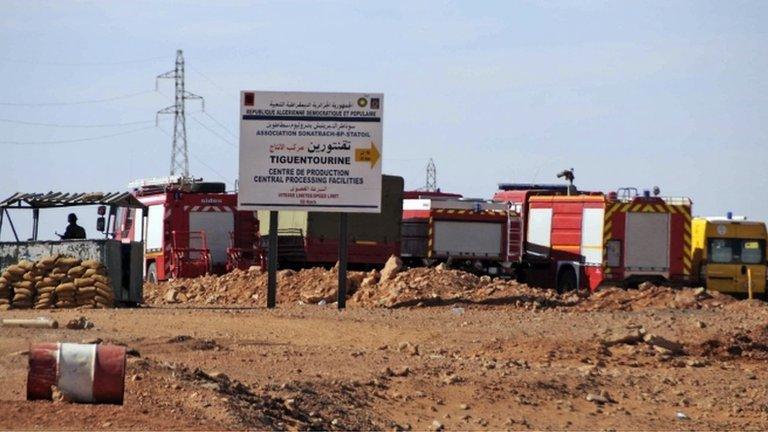Algeria siege: 'I wore a necklace bomb'
- Published
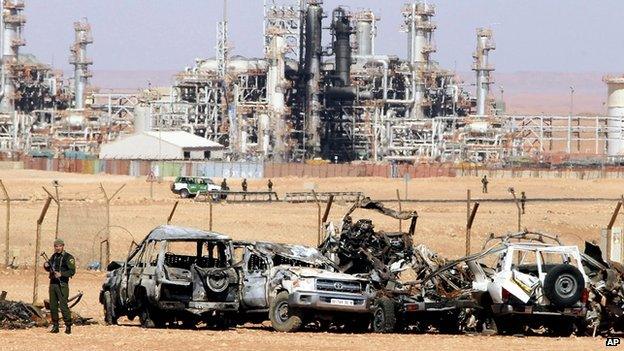
The survivors of January's siege of an Algerian gas plant still cannot believe they are alive. Forty of their colleagues died when Islamic militants took them hostage. The Algerian army opened fire on the convoy of hostages and terrorists as they broke out of the plant. It is only now that some have felt able to tell their stories.
For BP team leader Lou Fear and his wife Lori at home in the UK, the morning of 16 January 2013 began as usual with a text message from Lou. But the content was anything but normal.
It told her terrorists were roaming around - the plant was under attack. Lou was barricaded in his office with some colleagues and hiding behind a filing cabinet. The militants were just outside.
"Somebody tried the door handle and they were saying, 'Come out, come out, we're friends,' in Arabic," says Lou. "I would never have believed it would be a terrorist attack. It was incomprehensible, but it was real."
"My world just froze… I couldn't think what to do," says Lori, thousands of miles away in Lincolnshire.
"I didn't know what circumstances he was in, if he was close to the terrorists, if they could hear the beep of the messages come in. I did not dare to reply to it. Maybe I would give away his hiding place."
Lori did decide to send a few messages but did not do it too often because of the noise. In one message she begged Lou to send a text to their children. He broke down and cried. He could only deal with his wife at this fraught moment.
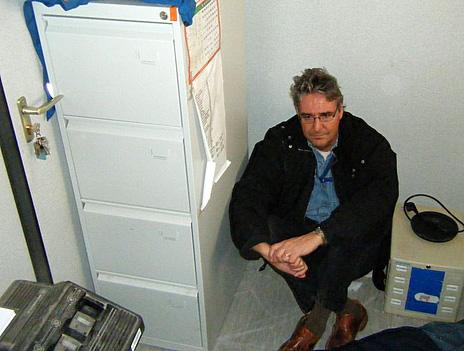
Lou Fear's colleague took this image of him during the siege - Lou is sitting behind a filing cabinet which is jammed up against the office door
The In Amenas gas plant is a joint venture between the Algerian state oil company, Britain's BP and Norway's Statoil in a remote desert region in southern Algeria. The plant is a showpiece - vital to the Algerian economy.
Three dozen terrorists from the Signed in Blood Battalion linked to al-Qaeda had taken Algerian military police, responsible for security, completely by surprise. First they attacked a bus carrying workers just outside the compound then broke into the plant itself.
Nick Hitch, BP project general manager, was in the living quarters. He was seized by terrorists searching room by room for expatriate workers. Nick was shocked to recognise a cook who worked inside the plant.
Nick Hitch recalls the moment one of the terrorists detonated a bomb next to him
"It was clear that it was an inside job," says Nick. "There were 20 or 30 Algerians who were clearly assisting the terrorists and very friendly with them and even came when we were held hostage, to look at us as if we were in the zoo."
Nick was taken into the courtyard where hostages were arranged according to nationality. As the Algerian army quickly surrounded the plant he was grabbed and used as a human shield by a terrorist who threatened to bludgeon him to death with a crowbar, but worse was to come.
"They arranged an explosive necklace round all of us," says Nick. "A terrorist had a large amount of explosives with a detonator attached by a yellow cord wound around all our necks, which I think probably would have decapitated us if it had gone off."
The hostages were sitting on the ground and the cord connected them together.
Lou meanwhile had decided to scout around outside and sent Lori another text.
"He said, 'I popped out to get some water,' so I was getting really scared," says Lori.
"How can you pop out when there's terrorists about, how is that going to be safe? Why isn't he staying hidden?"
But then the texts stopped. Lou's mobile battery had gone flat. He was back lying low in his office but Lori had an agonising night with no news from him, and for Nick and the hostages there was a long cold night, still linked together as a human bomb.
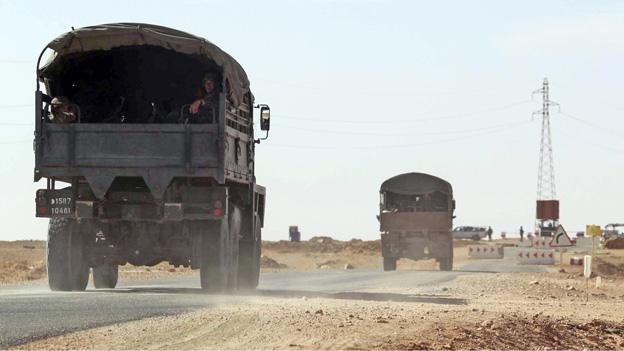
In the morning of the second day the pressure mounted as commandos from the Algerian security services - the so-called Ninjas - took control of military strategy. Firing into the plant increased and helicopter gunships buzzed overhead. Algeria has always taken a hard line, refusing to negotiate with terrorists.
Nick Hitch was told by his captors he would be the first to die unless the army pulled back within two hours. He called a colleague and told him he was going to die at 10 o'clock and said goodbye to him. The minutes ticked away.
"The deadline passed, but I still thought for the next hour or two they could shoot me at any point," says Nick. "I didn't expect them to be precise timekeepers but having said they would shoot me I expected it to happen at any moment and so the terror continued really."
Then an army rocket killed the militants' leader and the siege reached crisis point.
Nick was one of three dozen hostages loaded into jeeps by the terrorists shouting "Allahu Akbar" and saying goodbye to each other.
They re-worked the explosives into a bomb in every vehicle, and as they drove out of the plant army helicopter gunships opened up on the convoy of five vehicles.
"It was an incredible noise, like a hailstorm on a flat roof, but so loud that even though everyone was screaming I could hardly hear the screams because the sound of the bullets hitting the vehicles was so loud," says Nick.
Then Nick's vehicle hit a ridge and rolled over. The terrorist sitting next to him detonated the bomb and there was an enormous explosion.
"I could see everything in front of me like a big, just purple circle [which] shrank into a small white dot like an old television going off," recalls Nick, "and I thought I was dead at that point, because everything went out."
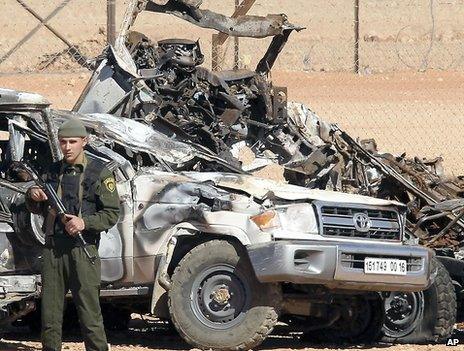
Out of 35 hostages who got into the cars, only Nick and three others survived. Lou spent another night in hiding but he had seen the convoy being blown up and was determined to escape. Lori, glued to the television in the UK, watched Prime Minister David Cameron warning there would be bad news ahead.
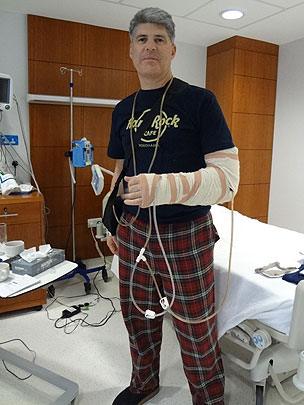
Nick Hitch's arm was injured in the explosion
"An awful cold feeling went down my spine, that I probably wouldn't see him again," remembers Lori.
Lou and the others hiding in his office decided to go over the fence at 02:00, nearly three days after the attack began. He was lost in the desert for 17 hours before he was rescued and was able to call home.
"I picked up the phone and this voice said, 'It's me I'm all right, I'll be home in a few days.' And it was a new phone and I cut him off," says Lori. She had been trying to put him on speaker phone so that their children could hear. "But I'd heard his voice, I knew he was alive."
After the attack, the Algerian government promised an inquiry but it is not clear the findings will ever be published. Internationally the army's actions have been questioned.
"I think they didn't necessarily want to harm us as expats but it was clear that we were not their priority," says Nick, "I think they were humiliated by the fact that a small force of terrorists, perhaps 30, got in under the noses of 150 gendarmes... and they wanted to flatten them and end this crisis as quickly as possible."
Unlike Statoil, BP are not holding an internal inquiry into what happened, and that concerns some of the hostages.
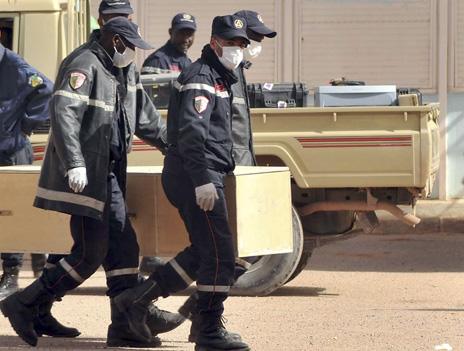
"Forty people is a horrendous loss of life and over half of them were personal friends, and to think that their loss would not even merit a proper inquiry is very distressing," says Nick.
"In the way corporations operate, I would be held accountable if something happened like that, if there was an incident at the plant," says Lou Fear. "So somebody should be accountable or there should be a proper inquiry to find out what happened for our own piece of mind."
BP says it is co-operating with a British police investigation on behalf of the UK Coroner and that the inquest will be more comprehensive than a BP internal investigation.
Those who survived the gas plant attack are still trying to come to terms with what happened and the loss of friends who did not come home.
"You try to normalise and do stuff together," says Lou. "But every now and again you get sad and get emotional."
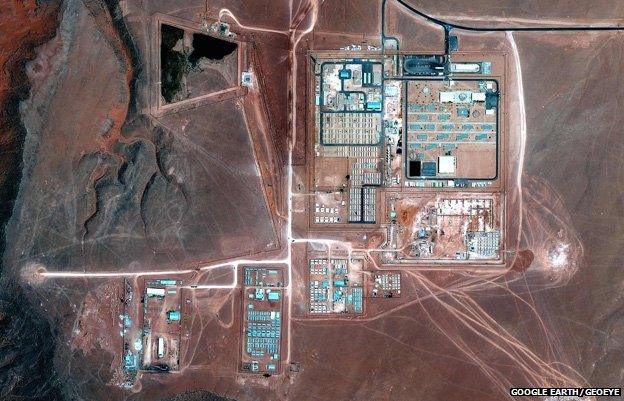
The In Amenas gas plant from above
This World: Terror in the Desert will be broadcast on Saturday 31 August at 21:15 BST on BBC Two. Or catch up later on BBC iPlayer.
- Published21 January 2013
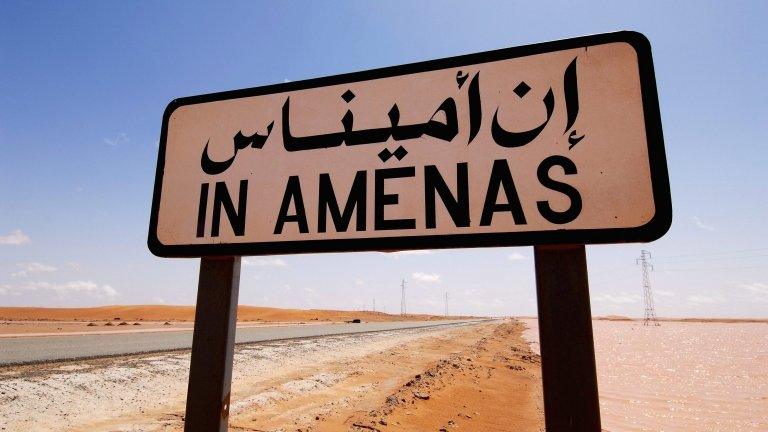
- Published21 January 2013
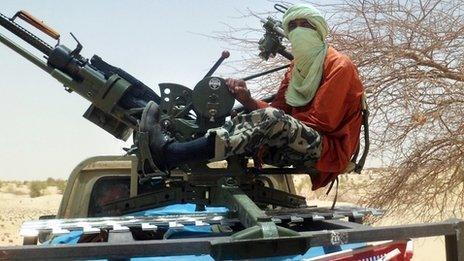
- Published25 January 2013
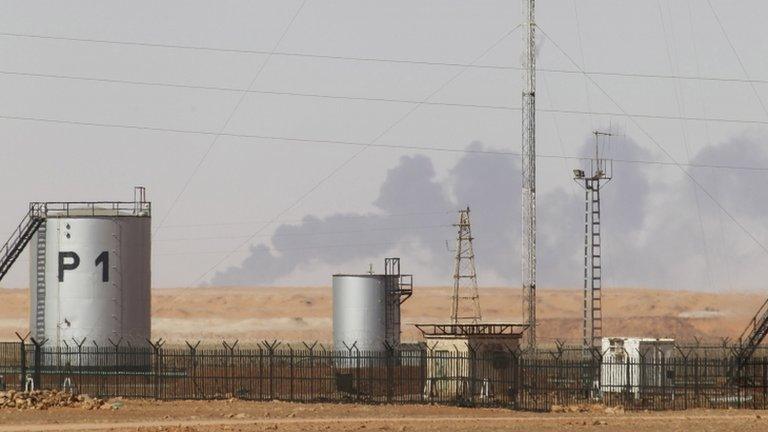
- Published21 January 2013
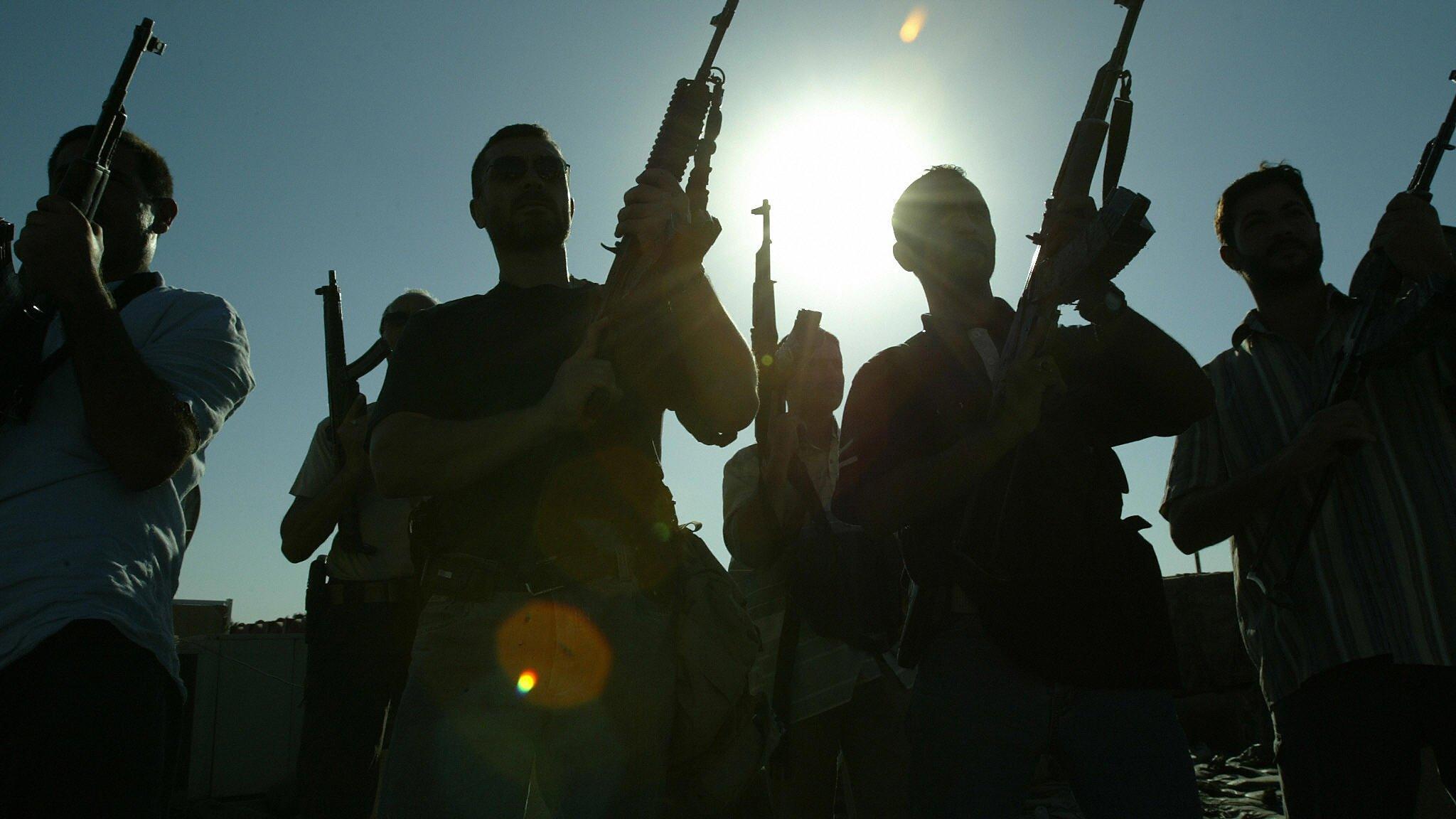
- Published19 January 2013
- Published18 January 2013
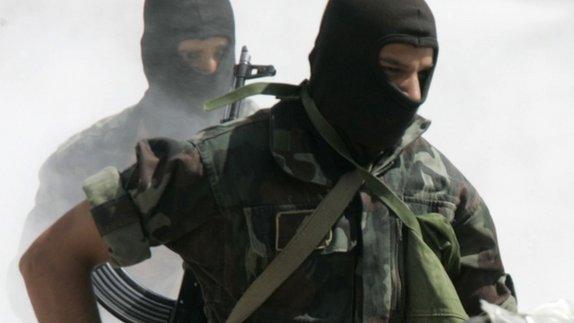
- Published16 January 2013
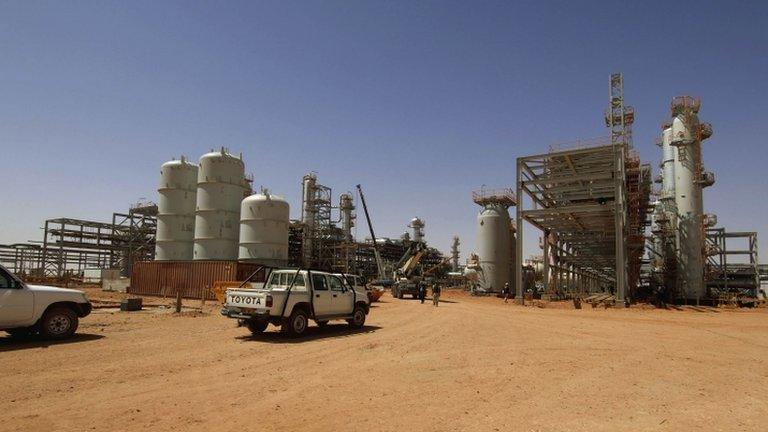
- Published21 January 2013
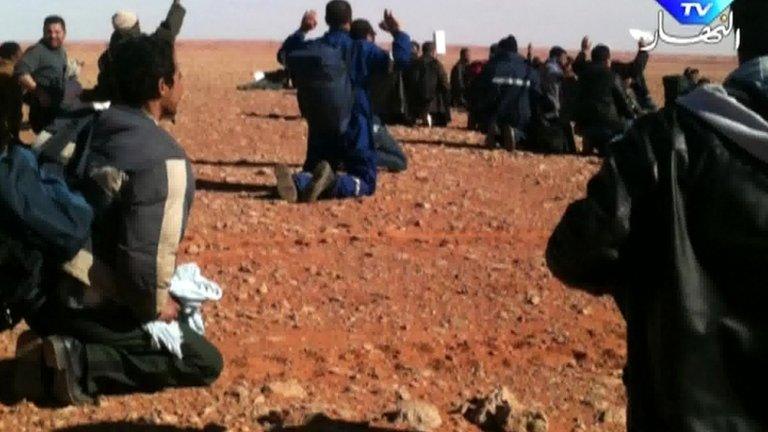
- Published17 January 2013
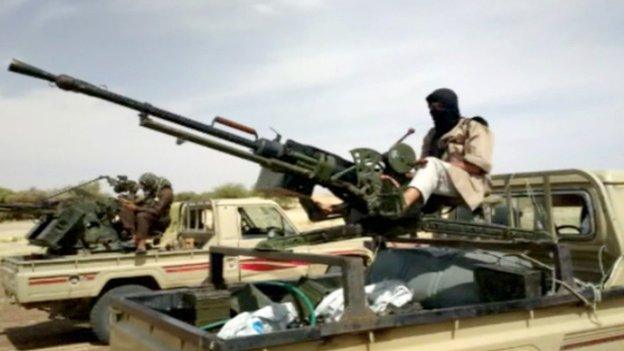
- Published9 September 2024
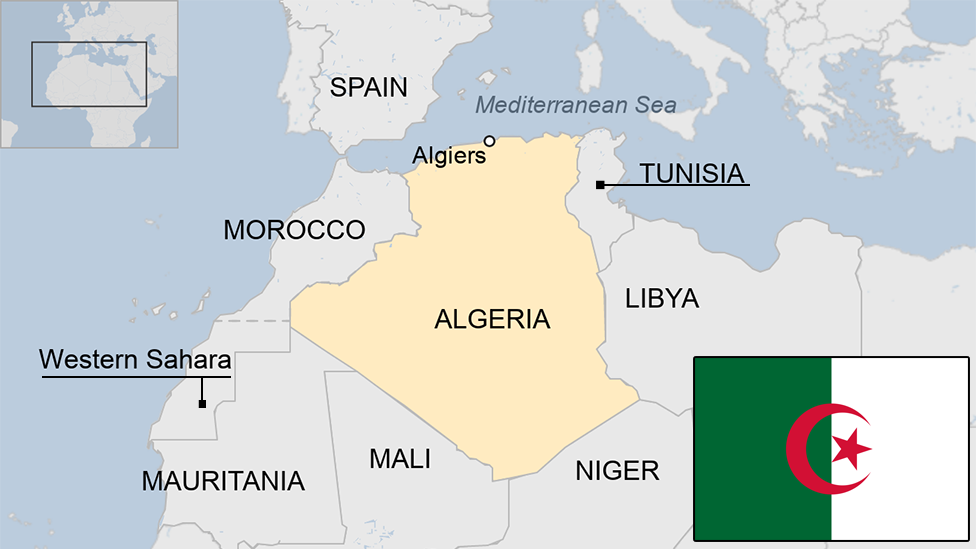
- Published31 May 2013
